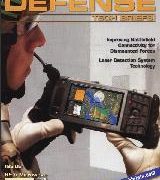National Defense Industrial Association has a highly informative article, Army, Marines Face Uphill Battle To Lighten Troops’ Battery Load, about batteries and the heavy load they impose on soldiers. Of the 130 pounds of gear a modern soldier lugs around, 35 may be due to batteries. This excessive weight limits his maneuverability and may even cause injuries.
In addition, batteries are expensive (“An infantry battalion on a one-year deployment typically burns through $150,000 worth of batteries”). The frequent need to replace them, as well as their complete lack of standardization, presents a logistical nightmare.
The military has identified two approaches to decreasing their battery dependence. One, they want batteries to last longer, so the warfighter carries less of them, and needs to refresh his supplies less often. Battery research is a frustratingly slow and expensive process. An approach that has had more immediate results is utilizing solar power to recharge batteries (may give a whole new meaning to the phrase “sunshine soldier”).
AMREL has focused on a third approach, which is to design small computer platforms that use less energy than larger form factors, but have the same processing power. The rugged ROCKY DB6 handheld weighs less than two pounds, but can support the same standard Windows 7 and Linux Operating Systems as larger platforms. Not only is its compact size easier to carry, but it reduces the number of batteries needed in the warfighter’s gear. Also, it is designed to be used for multiple applications, which diminishes the number of needed computing platforms and, thus, reduces the soldier’s burden.




There is likely not going to be one definite answer to the battery problem. While I have seen great advances in capacity over the past couple of decades, they have been incremental and will likely continue so.
One problem is what one might call the “Windows syndrome,” i.e. we expect, even under extremest mobile conditions, the same functionality as we do on the desktop. Compare that to, say, the wearable computers used in scuba diving; they provide basic life-supporting information and are completely reliable, yet their battery life is usually measured in years rather than hours.
Maybe the answer to the battery problem is optimized (minimal) hardware tailored for jobs and running targeted apps, rather than seeking to cram a full desktop OS and full desktop functionality into mobile systems.
posted @ Thursday, May 05, 2011 10:04 AM by Conrad Blickenstorfer cb@pencomputing.com